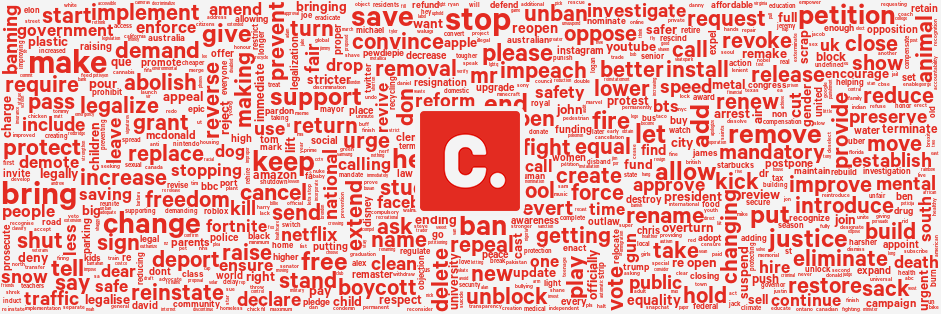Activism is about passion, but it’s also always been a numbers game. While many of the great social movements of history tend to be remembered for the words and images of their most prominent leaders, few have brought about lasting change without inspiring hundreds, thousands, or millions of ordinary citizens to join the cause.
Historically, these movements were mostly born locally—in meeting halls or gathering places often deliberately hidden from public scrutiny. The advent of the web, however, brought a new way for people to gather and organize. More often than not, online conversations around agitating for change eventually lead to a common proposal:
“We should start a petition.”
For all the online hand-wringing that took place over Millennial “slacktivism” in the early part of the decade, petitions like those on Change.org regularly lead to life-changing outcomes by influencing policy and decision making at the highest levels.
But convincing people to do anything is hard, and convincing thousands of people to support something can feel impossible. Platforms like Change.org give users a place to push for the change they want to see, but it’s still up to individual activists to craft a pitch and tell a story that moves readers from interest to engagement to action.
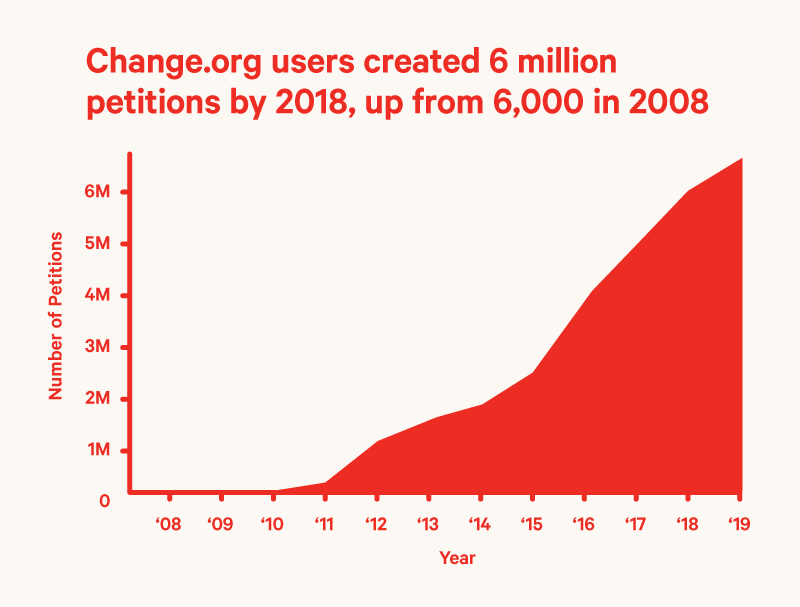
The best titles get attention and tell your story immediately
On Change.org (or anywhere you’re writing on the web) the first—and most important—chance you have to tell your story is in a title. While there are an abundance of resources online on how to write great titles, many of them advocate for hooks or clickbait strategies that could feel tired or played out to an average reader, and potential petition signers are not necessarily ‘average readers.’ The Change.org platform is the largest online hub for civic activism in the world, and the 6 million and counting petitions started on the site represent one of the most comprehensive raw datasets on activism ever collected.
People engaged in online activism are passionate, motivated, and looking for a cause to support, so while attention-grabbing techniques may pique someone’s interest, the true language of protest and change requires making a rapid, meaningful connection between your reader and your cause. Words, structure, tone, and length all matter, and everything needs to come together in a very limited space. What’s more, activism is highly personal—creating a campaign on Change.org can feel overwhelming and emotional, but knowing you’ve written a great title is the first step toward building the confidence to create the change you hope for.
This first-of-its-kind report from Change.org is based on raw text and data from over 164,000 English language petitions that were started between January 2018 and May 2019 and gained at least 5 signatures. While the report is ostensibly about Change.org, the broader goal is to help activists operating in any medium understand the language that drives others to action. The report exists as a tool for budding activists everywhere and is intended to inspire individuals to take the first steps toward creating work they can be proud of and which could drastically alter the lives of others.
Certain first words in titles correlate with high performance
Readers on the internet are bombarded with messages—“Like” this, “Favorite” that—so in the battle to bring supporters to your cause, the minutiae is what matters and what can truly set a petition apart. General wisdom says to write a title in a strong, assertive voice, but how can you set that tone from the very first word a reader sees?
To explore this, we examined several word categories from the General Inquirer, which provides human-coded word tags as simple as “Positive” vs. “Negative” or as complex as “Relates to morality” or “Implies direct causation.” After comparing first words across the dataset of petition tiles with the 15 tag categories, we found five word categories had a statistically significant correlation with petition signatures.
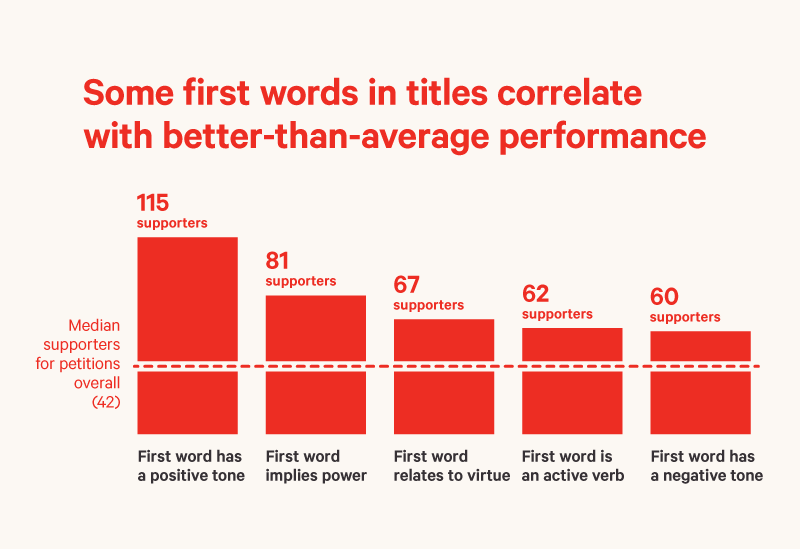
Within this graphic are several general ideas, such as portraying confidence, control, and positivity, but what does this actually look like in practice? We next looked at the top 10 words that fell into one or more of the above categories, exploring how frequently they appear at the start of titles and how many signatures these petitions receive.
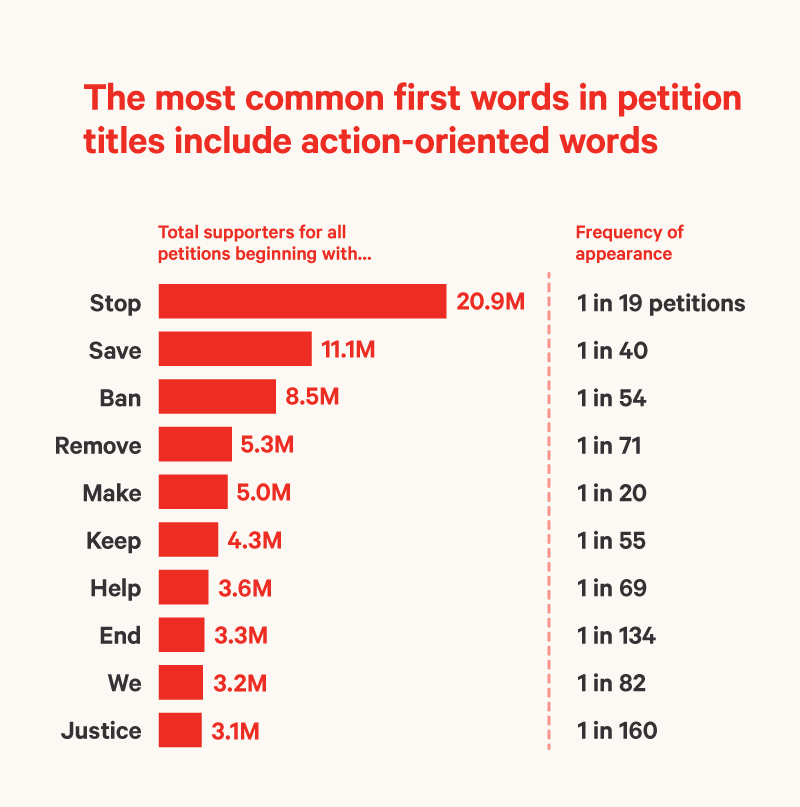
Of course, just starting a petition with a previously effective word doesn’t necessarily lead to success; still, petition titles beginning with these words tended to overperform on Change.org. Below is an example of each of these words being used effectively in beginning a petition title.
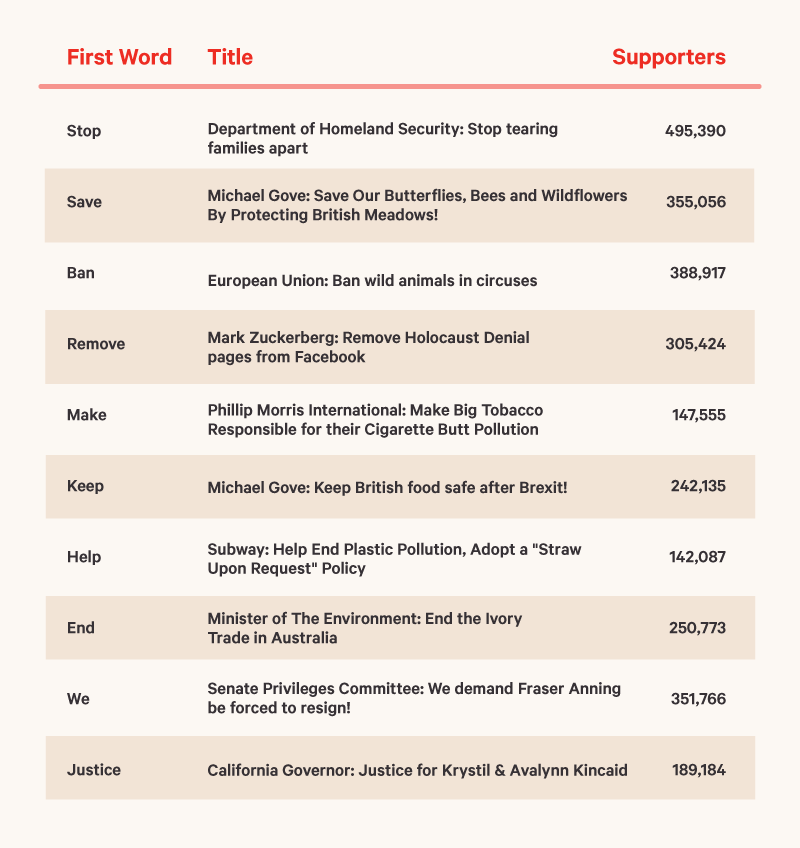
The most effective first words on Change.org
However, over and over in the data we found that the most popular titling choices on the site only had partial overlap with what turned out to be the most effective titling choices users made. In the case of first words, the ones that performed best on average nearly all seemed to signal the ideas of restoration of rights or coming to the aid of others. While there is some overlap with the most common words (e.g., “Stop” and “Preserve”), words such as “Grant,” “Preserve,” “Approve,” and “Help,” were less frequent but highly effective.
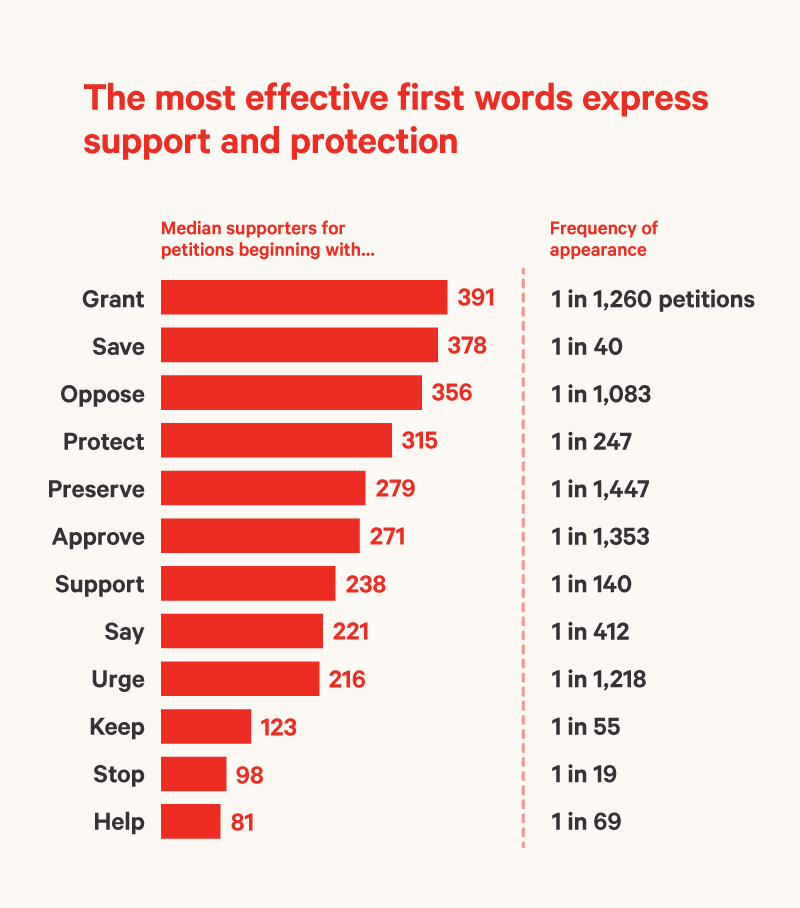
As the examples below illustrate, the most effective words mostly seem to be used in helping those in need, whether they be workers with disabilities, athletes exercising a right to free speech, individuals and families coping with cancer, or ordinary citizens seeking the right to protest.
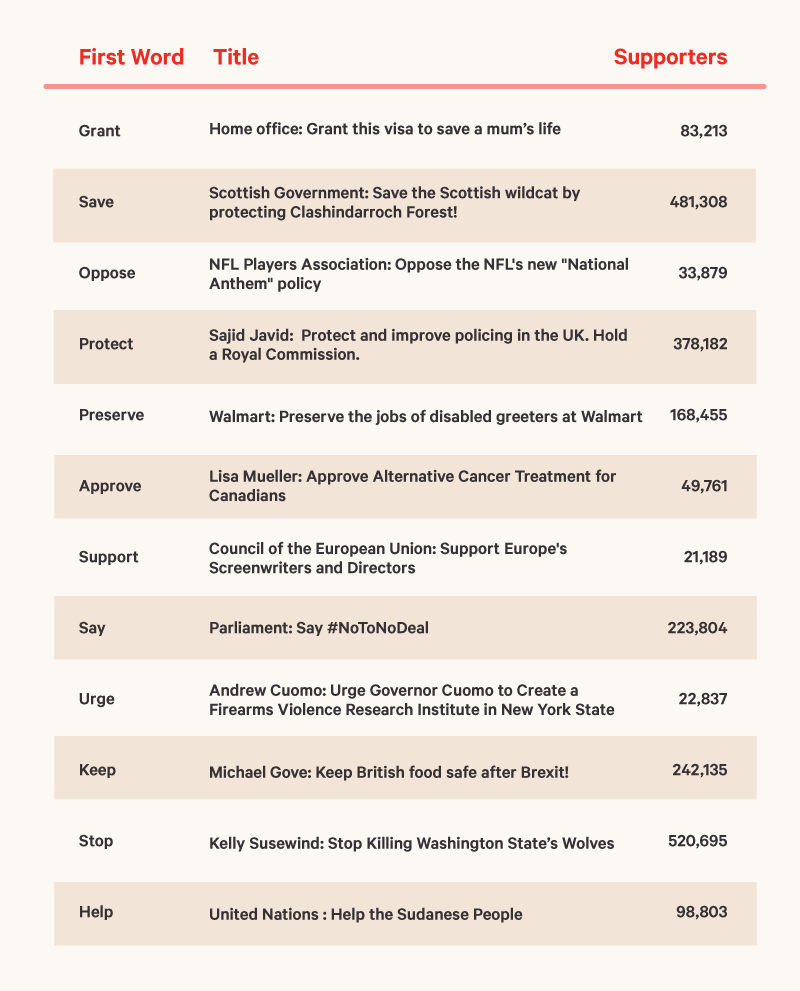
In the U.S., there is a preference for words signaling resistance and opposition
We also discovered several interesting differences between countries. In the United States, more aggressive terms like “Justice” and “Oppose” correlated with the highest median petition supporters, whereas “Save” was the most effective first word in Canada, Australia, and the UK. In the UK, both softer (“Provide”) and harsher (“Demand”) words did well, and it was also the only country in which “Reverse” appeared in the top 5 (perhaps owing somewhat to the controversial Brexit vote).
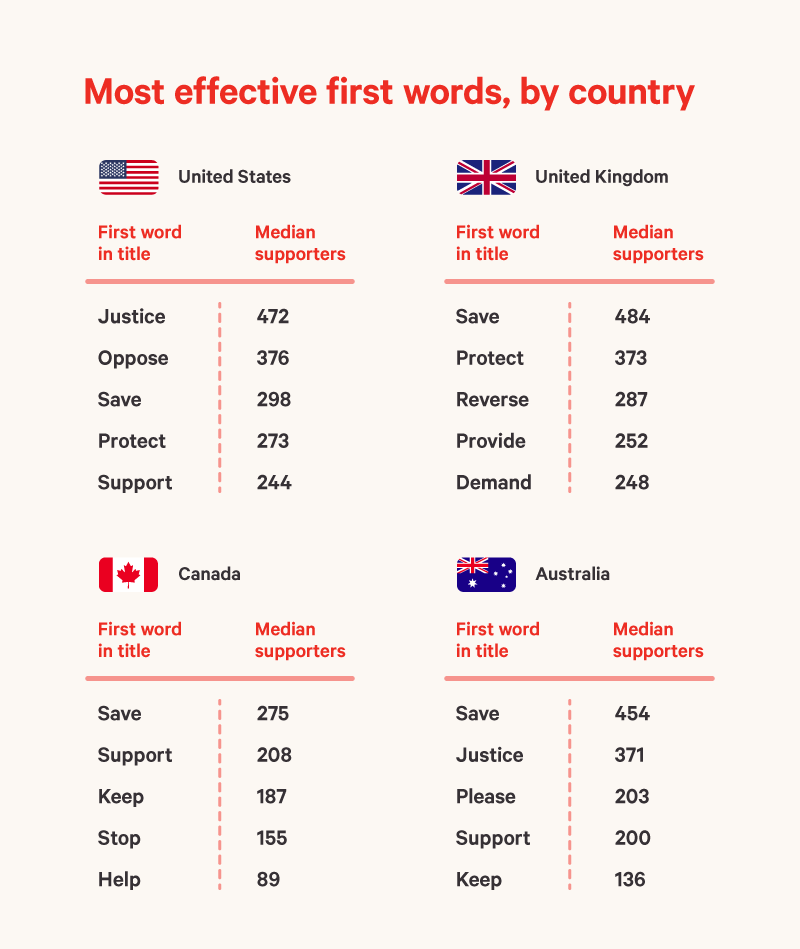
Takeaway: Choose first words that get attention and convey action
Of course, just starting a petition with a certain word doesn’t necessarily lead to success on its own. Still, thinking critically about something as seemingly trivial as the very first word of a petition is crucial for activists hoping to stand out and win people to their causes. We found that action words, particularly those that expressed support for others, did exceedingly well on average, as did words with more negative connotations that quickly demonstrated discontent with the status quo. Ultimately, this will be a personal choice and one that can be informed by looking at past successful petitions, but the insights shown here are meant to help you in taking the first step toward creating a powerful petition. If you feel ready to begin the journey of crafting your powerful petition, you can start a petition on the platform here.
Longer titles with crucial details outperform short statements
The adage for nearly all titles on the web is to be brief—assume your reader is busy and has a short attention span that must be captured immediately. It’s good advice, and it is clearly followed by the majority of petition creators on Change.org.
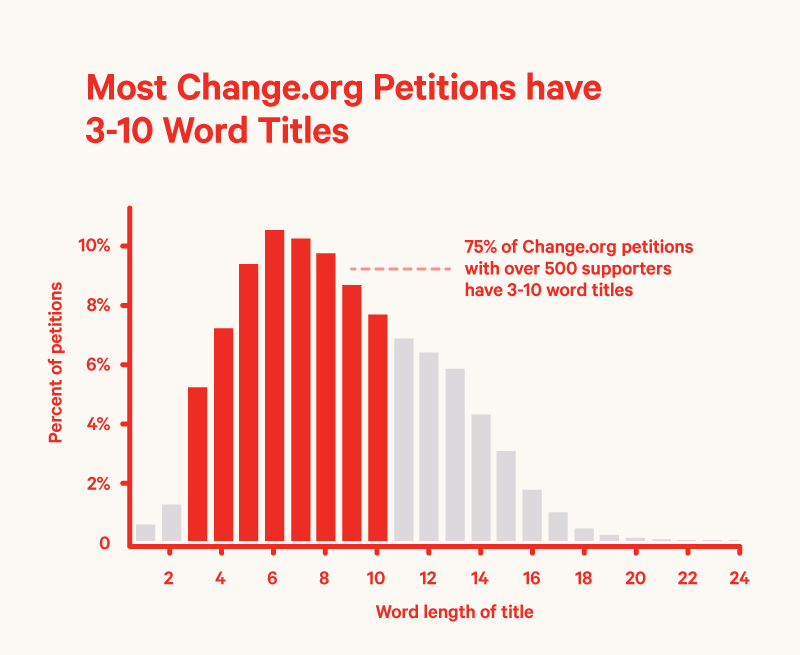
Looking only at the raw data, one would conclude that short titles simply perform the best; it’s certainly true that most of the petitions that do well on Change.org have shorter titles. However, it’s equally true that most of the petitions that don’t do well on Change.org have short titles. Basically, most petitions on Change.org just have shorter titles, but a deeper dive into the data reveals that slightly longer ones, though less common, actually perform better on average.
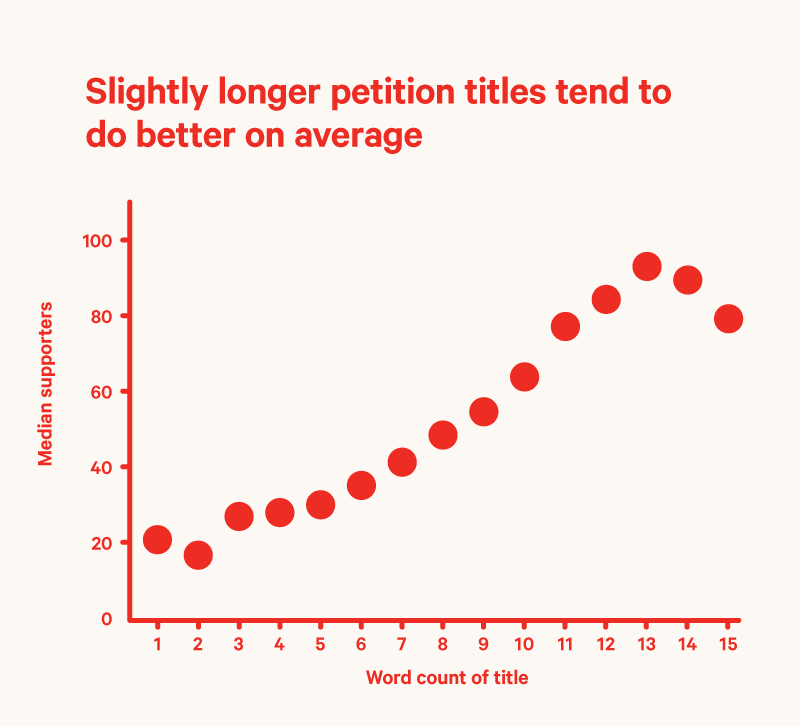
This contradiction runs counter to conventional wisdom and begs the question: Which one is better? It turns out the answer is, “It depends.” Short and long titles are both effective when they’re good, but the definition of “good” changes with title length. As we’ll explore below, short titles are punchy and address a decision-maker (the target of a petition) head-on, whereas the best long titles manage to tell a compelling story using a single sentence.
Short Titles Quickly Ask for Direct Action
Some petitions with clear, direct goals only need a few words to get the entire point across. On the low end of the title-word-count spectrum, petition creators make clear statements (many beginning with the words listed above) that directly target public leaders or large organizations.
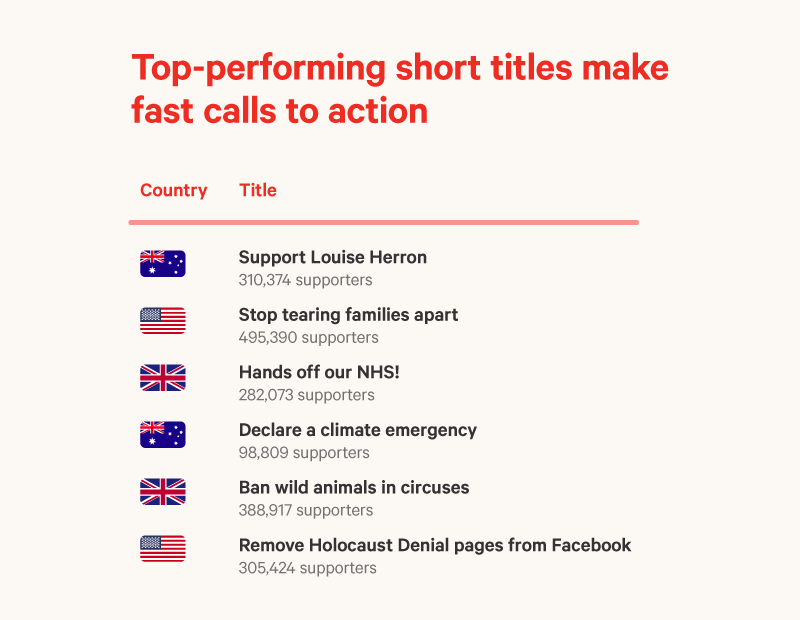
Nearly all of these titles begin with an action verb, and the ones that don’t all have other immediately identifiable nouns that evoke the interest of the reader. For example, the petition Nipsey Hussle Square launched almost immediately after the murder of the rapper and community activist, succeeding in less than two weeks.
Adding a key detail can boost performance
In medium-length titles (7-10 words), we see the same basic structure as short titles—a strong action word to start and naming a key target for the petition—but there is often a single additional detail that skillfully adds a world of context to the line.
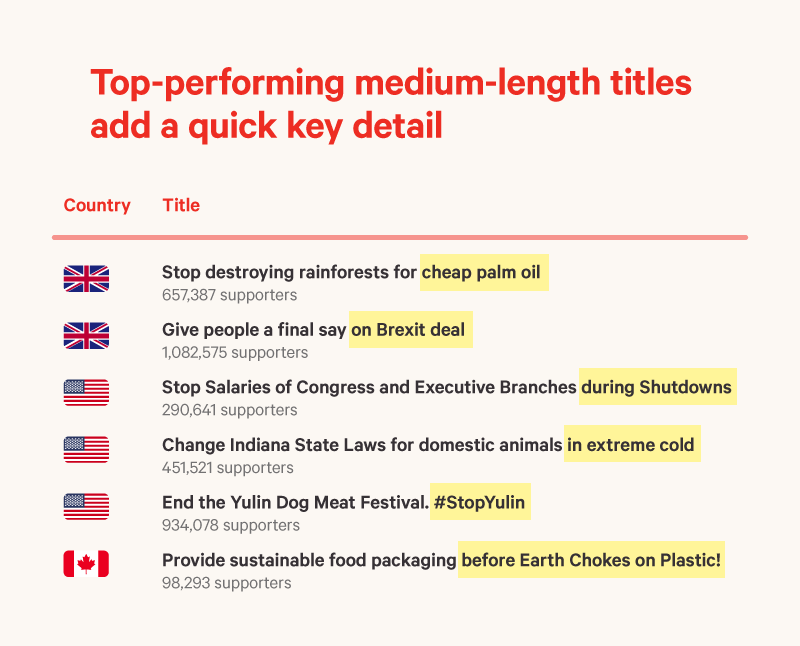
Oftentimes, these come in the form of prepositional phrases that are highly evocative to a potential supporter—they address domestic animals “in extreme cold,” contrast the grandeur of the rainforest with “cheap palm oil,” or use personification of the entire planet, describing Earth as it “chokes on plastic.” By adding a highly descriptive detail, these titles deliver dynamic micro-stories designed to inspire both interest and action in a reader who may just be casually scrolling a page.
Long titles are rare, but do the best on average
Longer titles are much less common on Change.org, but as we have seen above, they are actually associated with somewhat better median outcomes in terms of signatures from supporters. These titles go beyond a fast pitch and single detail, sometimes delivering an entire narrative in one sentence; they include descriptive tidbits and flourishes that paint a fuller picture to a potential petition supporter while still staying brief enough to hold a reader’s attention.
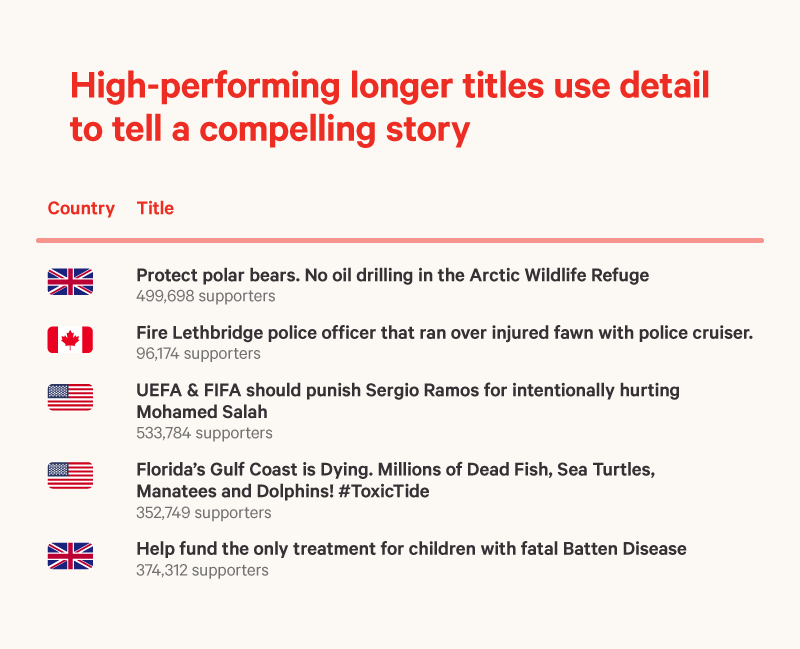
Longer titles lead off petitions that are seeking change for many of the same causes, but many of them include key details that may have been omitted if the author had followed a strict “Nothing over 10 words” policy. Details around protecting animals from extreme temperatures or additional context to crimes paint striking portraits of a situation, challenging the reader to learn more about the topic.
Choose the right title length to tell your story
While there is no single correct answer to how long a title should be, petition starters should be confident that anything in the range of 3-15 words has performed well on Change.org, and it should be less about length and more about story. In general, if you can’t paint the complete picture in just a few words, adding a key detail to communicate the urgency of a petition seems to have helped many of these campaigns earn additional viewers and eventual supporters.
Ready to write the headline that moves your readers to action? You can start a petition here.
Petitions are commonly addressed to powerful individuals or large organizations
The main goal of civic activism is to inspire others to take action. This includes both the supporters who sign your petition and the individuals or organizations with the actual decision-making power to follow through. A petition, like any story, needs characters, and often a central character of a Change.org petition is the person or organization the petition seeks to influence.
By far, the most common types of decision makers addressed on Change.org were either major political figures or private or public institutions. In fact, between January 2018 and May 2019, 7 of the 10 most-addressed decision-makers were organizations, with the other three being leaders in government.
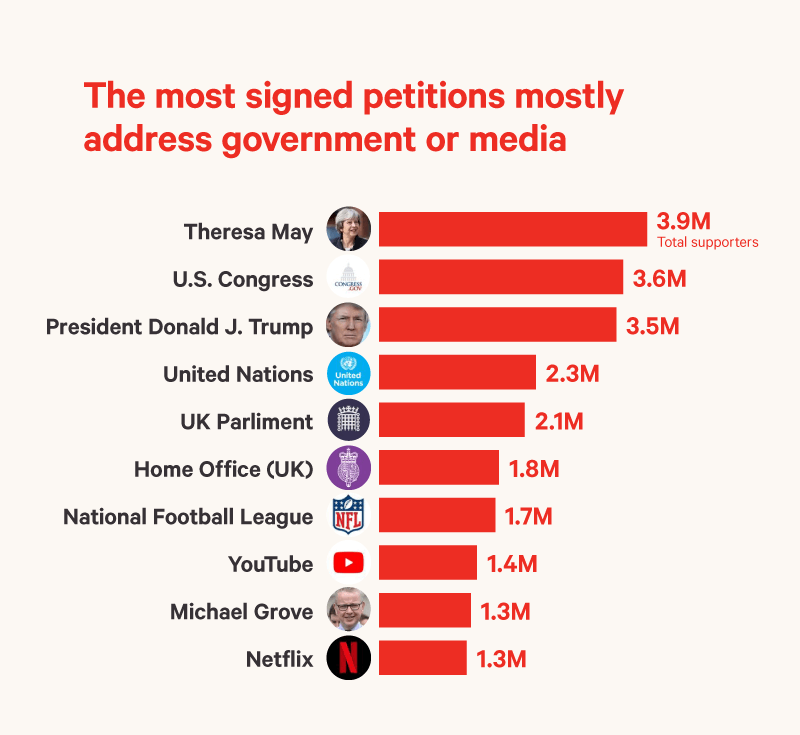
Looking across countries, we find that citizens overwhelmingly look to political leaders when addressing their petitions. Only one individual—President Donald J. Trump—appears in lists of the top 10 individuals petitioned in each of the four studied countries, perhaps not surprising given his status as the most polarizing U.S. President on record. Only one other person, Facebook’s Mark Zuckerberg, appeared on more than one list (he appeared on all except Australia). Again, this is perhaps not surprising given that the studied time period coincided with a period of unprecedented controversy for a company with over 2.4 billion monthly active users. Interestingly, the United States was the only country in the study whose top 10 list consisted exclusively of its own citizens.
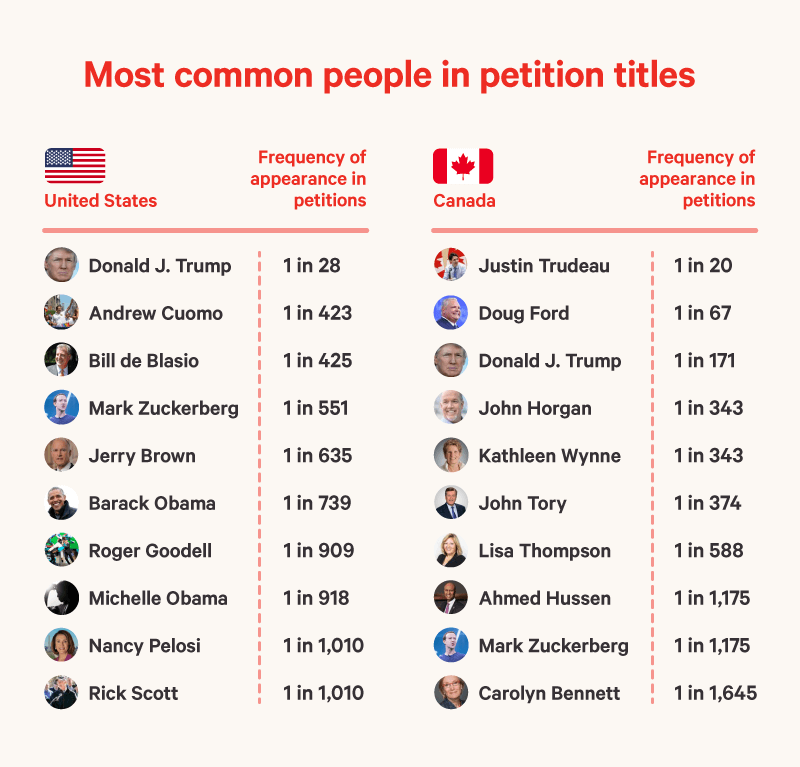
Below is a closer look at the top United States petition-getter, President Donald J. Trump. President Trump was the subject of the most-signed petition in the history of the platform in 2016, and he received thousands of petitions from U.S. activists from January 2018 to May 2019.
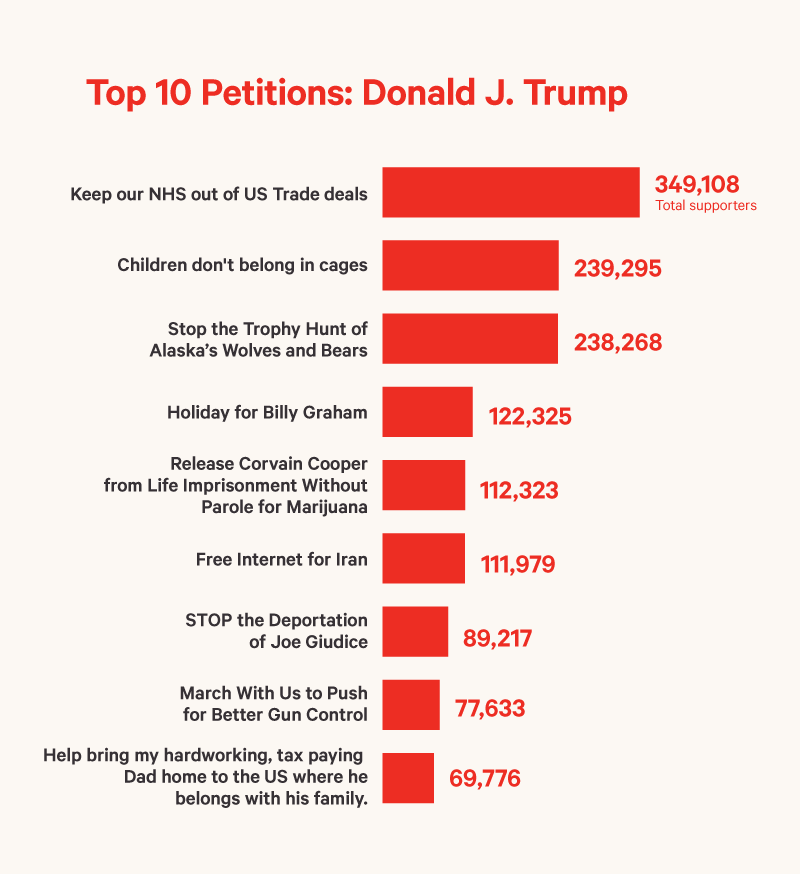
A slew of politicians were similarly petitioned in the United Kingdom and Australia in a trend only broken by Mr. Zuckerberg and petitions in Australia directed toward Elon Musk. Theresa May, who announced her resignation as UK Prime Minister in May of 2019, received hundreds of petitions from Britons during the studied period. While heads of state topped the lists in all four countries, Ms. May was the recipient of the most-signed petition among the group, a one-million-signatures-plus call for a second EU Referendum vote.
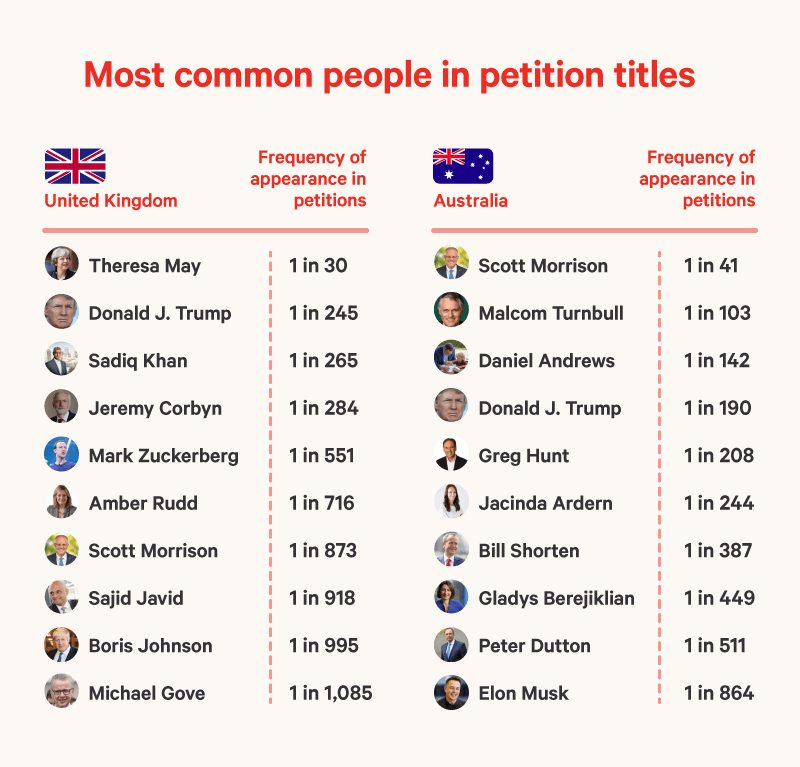
While Ms. May’s most visible petition dealt with Brexit, it was hardly the only cause that activists took up with the Prime Minister’s office. Below are the 10 most signed petitions directed at Theresa May since 2018, with advocates for women’s rights, access to healthcare, and stricter reforms on topics ranging from hate crimes to cell phone use while driving all crafting highly successful petitions aimed at influencing the Prime Minister.
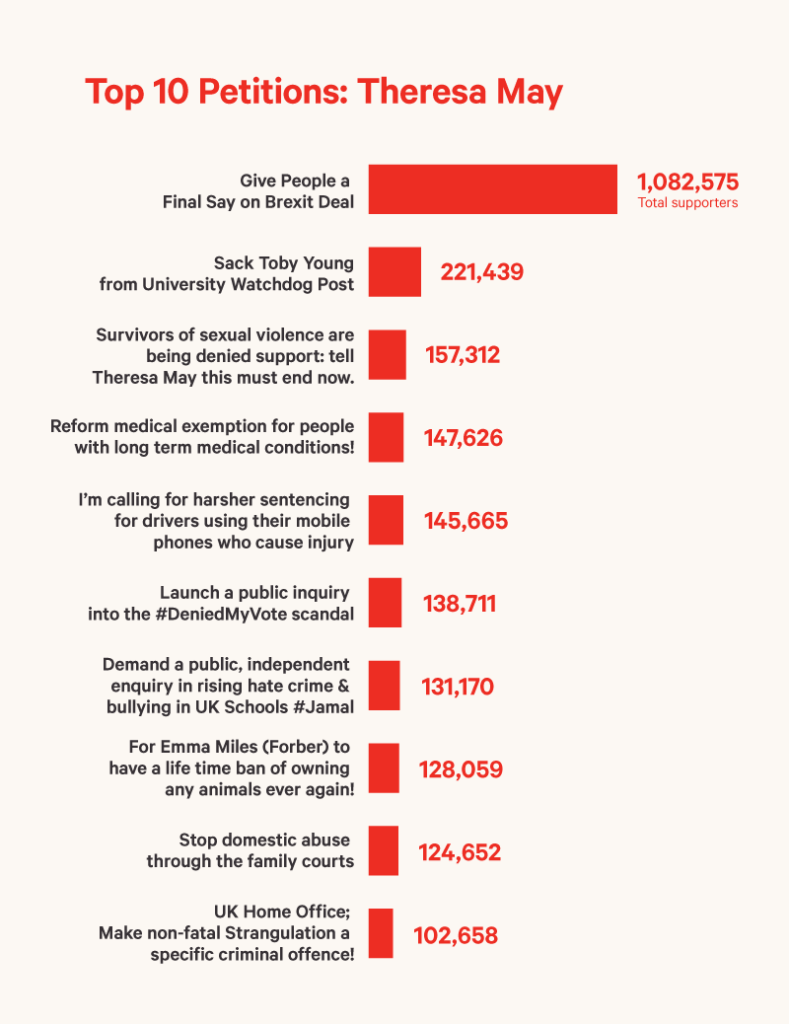
Petitions addressing large companies frequently gain traction
Change.org creators are passionate about effecting changes at many of the world’s largest corporations, with a particular focus on government, media/entertainment, and animal rights. Examining the petition targets most frequently addressed on the site, this becomes even clearer:
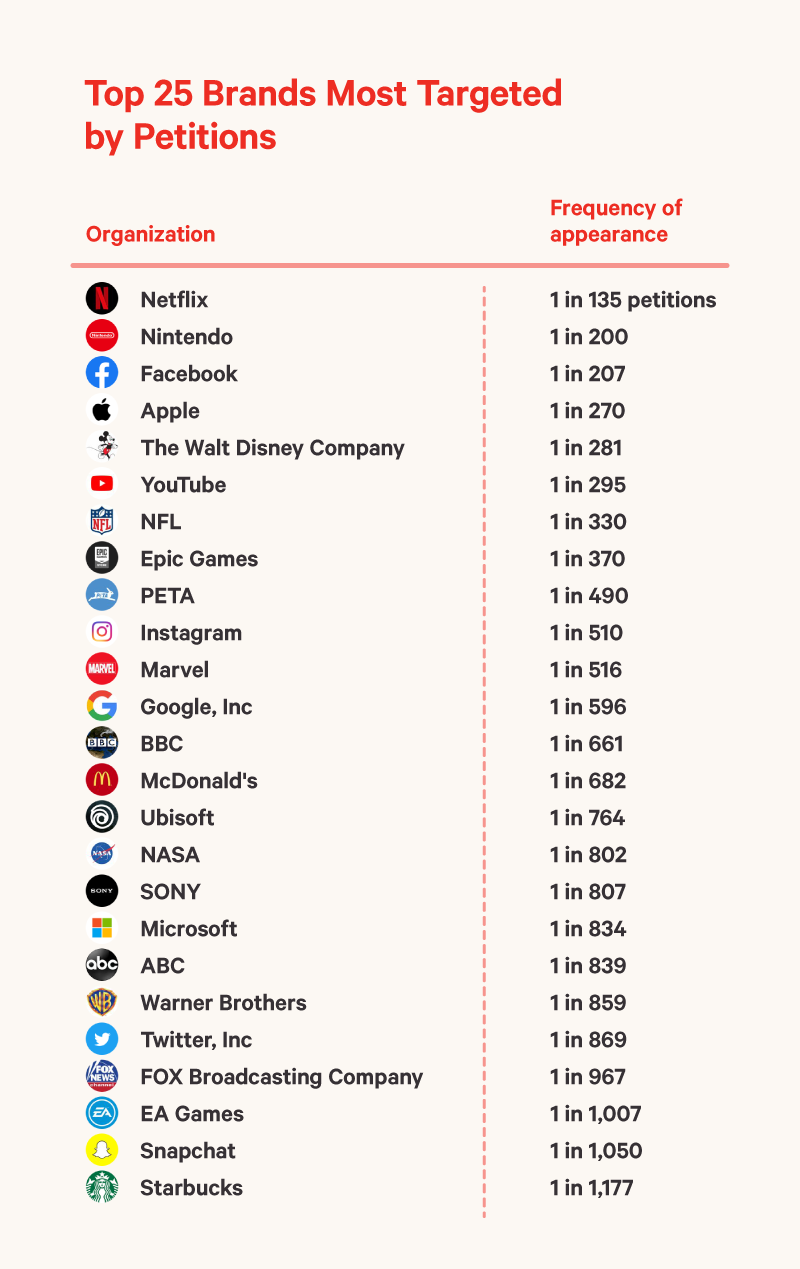
Companies at the intersection of media and technology such as Netflix, Facebook, the Walt Disney company, and YouTube all placed in the top 10 globally. A high volume of American petitions aimed at the National Football League (from a highly visible petition for “Sweet Victory” to be played at the Super Bowl Halftime Show to advocate for a fair living wage for cheerleaders) made it the world’s most petitioned sports league.
There was also a large trend in advocacy directed at video game developers, with petitions to Nintendo, Epic Games, and Ubisoft being among the most frequent on the site. Trends across the Change.org platform show that some of its most passionate activism relates to animal rights, and this was apparent in the large number of petitions directed to People for the Ethical Treatment of Animals as well as fast food providers, who are frequently petitioned on issues related to sustainable food production and animal welfare.
Best practices for choosing a target for your petition
Oftentimes, petition starters wonder whether its better to address an organization itself or instead target specific individuals with prominent roles there, and we found evidence of effective petitions that do both. There are dozens of examples of viral, highly successful petitions that address either specific people or organizations as a whole, and some of the best petitions find a specific person within an organization responsible for decision-making (e.g., a VP of Product for a petition to a technology company requesting a feature change or a politician within a political body rather than the entire body itself).
Direct addresses to individuals do have a better chance of being seen by the actual decision maker, but in many cases using an organization’s name in the title will be a stronger method for quickly attracting petition views and support. It’s likely that a blended approach works best here; in other words, addressing a petition to an individual with true decision making power while also mentioning their organization in order to maximize search visibility and engagement with potential supporters.
Address a decision maker with the power to catalyze the change you hope to see by starting a petition here.
Specific keywords related to geography draw in like-minded supporters
For people who make a living figuring out how to make something stand out on the internet, few concepts are as important as keywords. There are endless resources out there for professionals wanting to learn how to make a webpage “rank,” meaning it will show up prominently on Google or other search engines, and many of the same concepts can be applied to crafting a Change.org petition title.
Since we’ve seen that strong first words, title lengths, and naming prominent organizations all appear to matter, it’s important to also consider other general principles that make for a well-written, engaging title. We explored this topic using named entity recognition (NER), a powerful (though imperfect) method of automatically detecting different categories of keywords in text.
For these analyses, we chose to focus on measuring median signatures for petitions with titles that contained different types of entities. We primarily used a modified library from spaCy and restricted our analyses to eight categories (more are available, but they were so rare in Change.org titles that they were excluded from analyses). The results are below, and to ensure they were accurate we also tested with a second model that tags words more generally. Because each model tags somewhat differently, the numbers do not align perfectly, but the same trend is apparent.
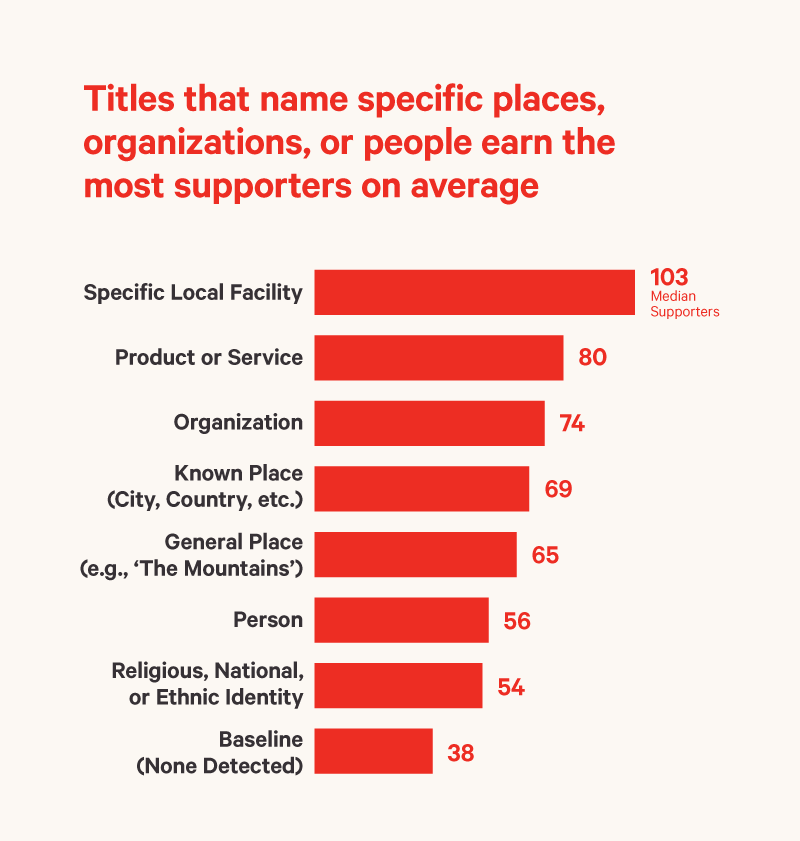
Strong evidence for the effectiveness of local petitions
These were among the most surprising results of our analyses. Extremely viral petitions on Change.org tend to be about national or international topics, often addressing major corporations or entire branches of government. If you were analyzing only the most signed petitions on the site, the takeaway would be to simply replicate that method—aim as high as you can. However, Change.org isn’t just about global issues; it’s a platform for anyone to agitate for change, and this came through clearly in our NER analyses.
The top category— specific local facilities—typically corresponded with petitions seeking change at the state, county, city, or town level. These petitions may not jump to the top of Change.org’s all-time supporter rankings, but for the area they’re covering, their performance is substantial. For example, here is how NER tagged top petitions containing a ‘Specific local facility’ tag:
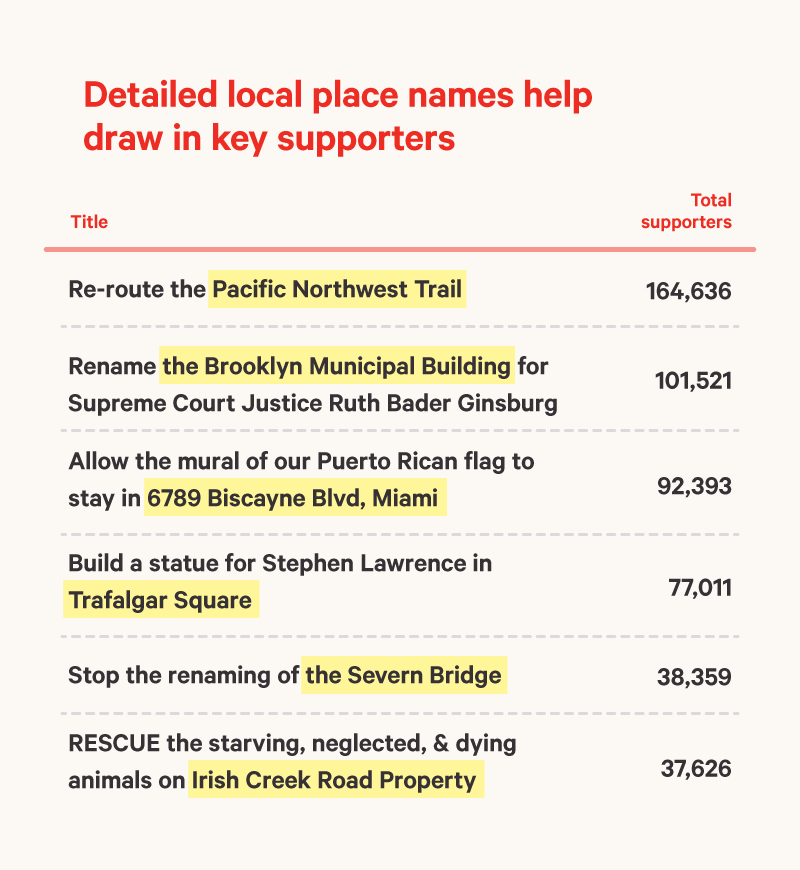
As you can see, these signature totals seem tiny compared to ones elsewhere in this article. However, the specific local facility tag is rare and is only triggered when a title contains a very specific reference. On the whole, titles like this perform better on average than almost all others on the platform. Local petition starters make up a major part of the Change.org community (at least 1/4 of all petitions are around local issues), and our evidence demonstrates the efficacy of the great work being done by local starters. Starting a petition is a highly-effective way to seek change at the local level, and we hope that the insights here help empower readers to do so.
Geographic keywords help others find and support your cause
Equally impressive is how well titles with “Known places” do. Essentially, this category can be thought of as more recognizable places like cities, states, and countries that are easily named. Here are ten examples of these titles on Change.org.
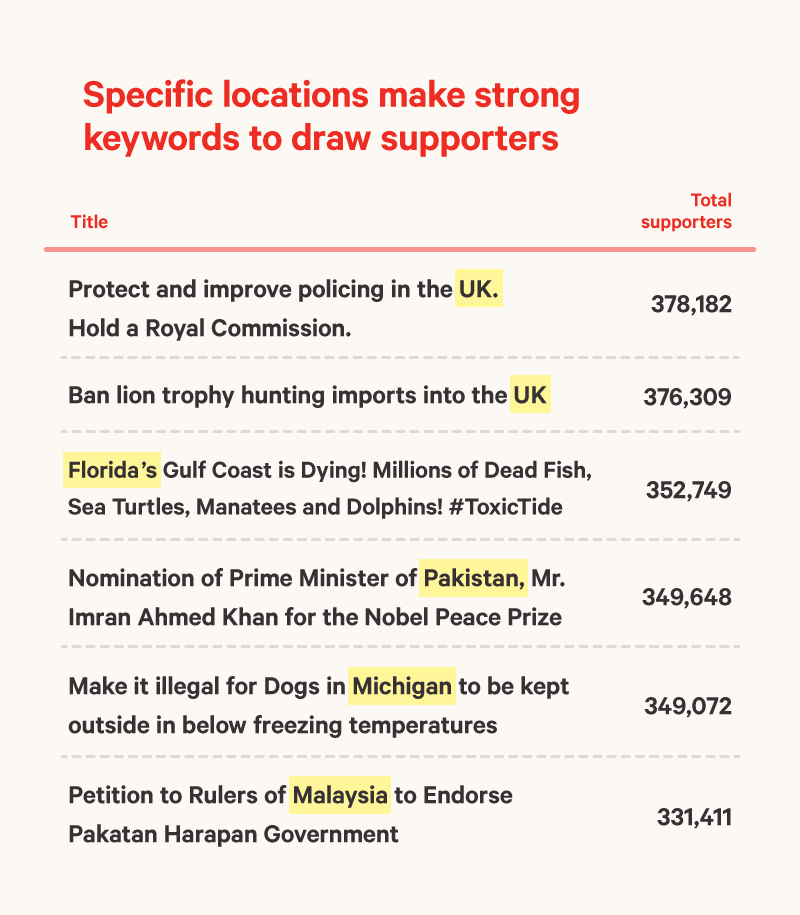
Again, the median signatures for titles containing this kind of entity were far higher than those containing just the names of people or organizations, again indicating that calling out specific places in a title is just as important as naming individuals or organizations.
How to choose keywords for your title
As we’ve seen before, looking only at top petitions versus the overall picture of petitions on the platform looks slightly different and speaks to different goals—hyper-viral petitions will probably always center on people or organizations with national or international standing, so it should be no surprise that these types of entities appear frequently in titles.
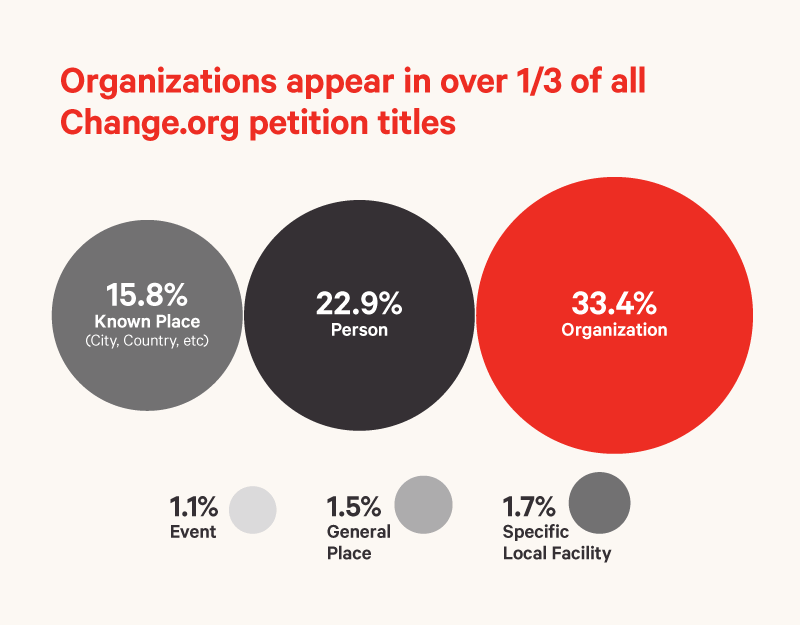
However, broad views like this should be considered alongside the somewhat rarer occurrences of local place names that frequently overperform. What we see in petitions across the platform is that the profile of ‘best on average’ looks different than the characteristics of high-performing, extreme outliers. Once again, the best choice for individual petitions comes down to the scope of your goals—if you’re seeking change on the city or state level, mention the city or state. If your goal is broader, such as affecting national or international policies, then targeting specific organizations or leaders is likely to yield better results. Ultimately, best practices will shift according to your goals and the change you’re seeking to create. In any case, no decision maker can hear you without a petition first existing, so if you’re ready to begin, you canstart a petition here.
#Hashtag #Victory
Finally, one last interesting piece of information from this research came from looking at the use of hashtags in titles. Change.org doesn’t support searching by hashtags like on Twitter or Instagram, yet for the petition titles that did use them, there was a marked increase in performance.
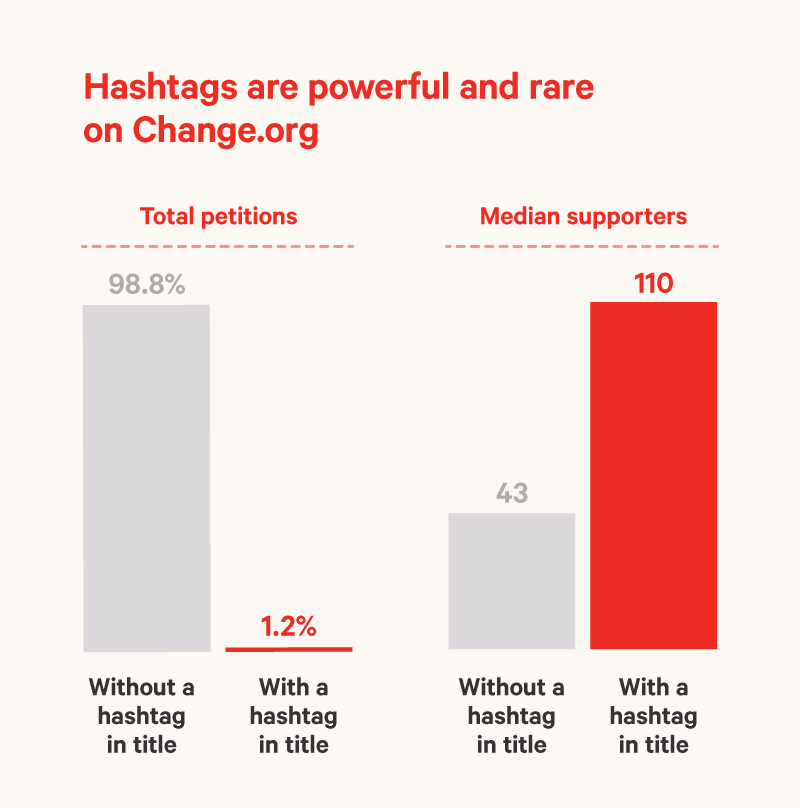
Why is this, if hashtags serve no practical purpose on the Change.org platform?
Essentially, petitions that use hashtags effectively in their titles tend to be part of larger movements. Hashtags in a Change.org title, though not functional for search, provide a common identity with a movement when it is being broadcast across other social platforms and give a petition a kind of brand unity that would be instantly recognizable to supporters. They also serve the secondary purpose of giving supporters a ready-made hashtag for their own promotion of the petition or the cause.
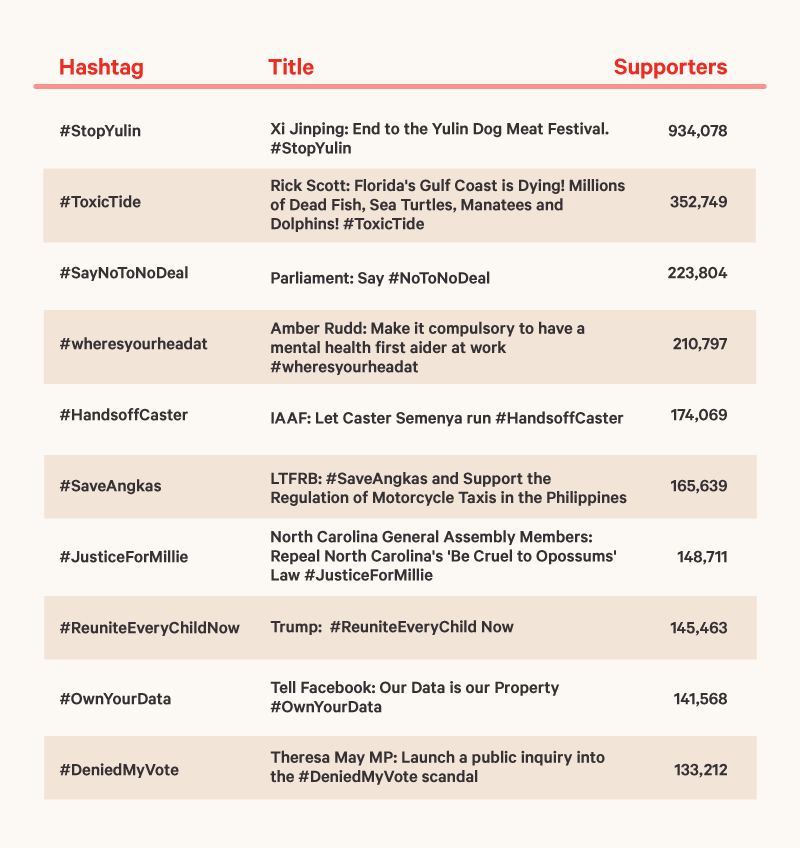
How to think about hashtags
Hashtags are by no means a requirement for petition titles, and their inclusion certainly doesn’t guarantee more signatures or support. Rather, existing movements using a hashtag on other platforms should consider including it in titles simply because it’s easy to identify, and petition starters who intend to promote their campaigns on social media may want to include a custom hashtag in their petition title that they can use later on other platforms. It’s likely that much of the success seen above is driven more by the fact that support communities around these causes already existed and petitions served to amplify it, but it nonetheless should merit consideration for any new petition starter on Change.org. We also provide guidance on how to share your petition on social media after it is created.
Petitions and activism are just as much art as science
I am deeply dissatisfied—about so many things, about injustice, about the way the world works—and in some ways, my dissatisfaction drives my storytelling.
Language can be parsed and studied by academics or by algorithms, and it can be pulled apart, dissected, and analyzed with respect to its structure, its tone, its position, or its voice. Still, the language of protest—the language of change—will always be equal parts art and science. People come to Change.org because they are dissatisfied—perhaps with their communities, or an organization, or even the world—but they come to this platform to stake a claim to doing something about it.
There are many recommendations on how to capture the hearts, eyes, and imaginations of potential supporters with an attention-grabbing petition title, but no title is perfect. The petitions that succeed on Change.org do so because they’re made by passionate people, those with the audacity to believe that the seemingly small act of starting an online petition can free the unjustly imprisoned, drive meaningful steps toward economic gender equality, or create a permanent means of support for heroes.
In crafting the title to your petition, remember that all of this advice is meant to inspire thought, confidence, and action in you, to help you take your passion for making a difference from something deeply held into something that is out in the open and shared with a community. By taking the time to create a petition title that speaks to the empathy, kindness, and sense of justice in your readers, you ensure you’re doing a service to your cause and hopefully playing a major role in creating the change you hope for.
Ready to start a petition on Change.org?
Nick Allardice is the Chief Product Officer at Change.org. Twitter, LinkedIn.
Methodology Notes
All petitions included in this analysis were originally posted on Change.org between January 1, 2018 and May 31, 2019. All petitions originated from users registered in the United States, Canada, Australia, or the United Kingdom. In order to simplify the data and ensure quality, only petitions with more than 5 signatures were included. This represented 98,481 petitions in the United States, 35,813 in the United Kingdom, 11,232 in Australia, and 8,225 in Canada. Exploratory data analysis was completed using Python v3.7.1 and several of its core libraries, and all natural language processing work was done with spaCy, Flair, Gensim, and Natural Language Toolkit. Fifteen word categories from the General Inquirer were also tested and 5 were used in the final report: Positive, Strong, Power, Virtue, and Active. Most of the original visual layouts were designed in Tableau 2019.2.

